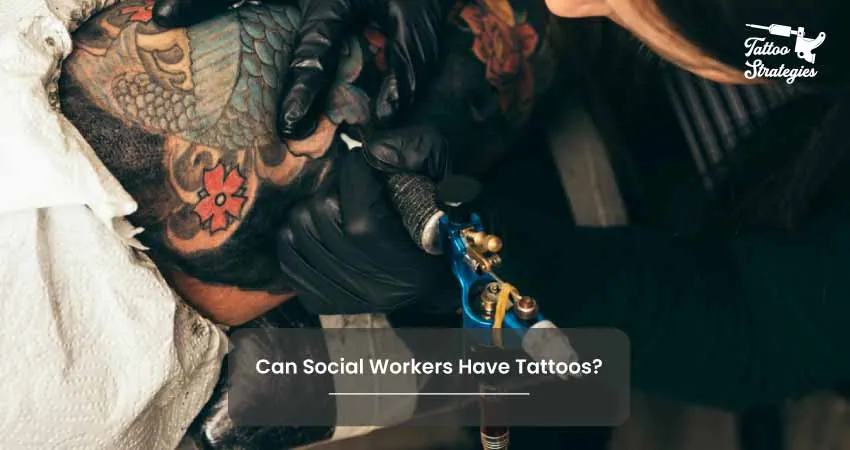Can A Social Worker Have Tattoos?
Imagine you want to become a social worker, and at the same time, you are willing to get tattoos. These choices might seem to clash with each other. And this might make you think, “can a social worker have tattoos?”
Yes, you can have tattoos while being a social worker. But you must be careful about the field that you might work in. Because some of the fields of social work, like child care or community service, might not be suitable for you if you are planning to get tattoos.
Scroll down to know more about which social workers are not eligible for tattoo owners and other related information.

Are Tattoos Unprofessional?

Unfortunately, in most workplaces, tattoos are considered unprofessional. However, there are no laws that make tattoos unprofessional or inappropriate in the workplace, and the people who have made this self-expressing art form.
Because some people don’t like them, tattoos are generally perceived as unprofessional. In our society, some people simply disapprove of someone just because they have a tattoo.
Let’s face it, most of us make little judgments about people based on their appearance, but some people go too far and assume that someone is unprofessional simply because they have tattoos on their bodies.
Can Social Workers Have Tattoos?

According to the Council on Social Work Education, social workers must “demonstrate ethical and professional behavior regarding professional appearance.” This instruction about professional appearance is, at best vague and fully subject to interpretation.
So, if you’re confused about whether a social worker can have tattoos or not, here’s the answer.
Yes, there are no particular guidelines that prohibit a social worker from having a tattoo. Even the National Association of Social Workers (NASW) does not advocate against or even consider visible tattoos to be unprofessional in appearance.
However, it does state in the “Risk Assessment for Field Visits” section of its “Guidelines for Social Work Safety in the Workplace” that when social workers are evaluating their vulnerability in the field, tattoos that cannot be covered “might attract/increase attention” in potentially unsafe situations.
So it is clear that tattoos are not unprofessional for social workers. Rather it depends on the situation whether a social worker will hide their tattoos. For this, you need to know which type of social work might require you to hide your tattoos.
Types of Social Work and The Acceptance of Tattoos
Social work is a wide field. And the different types of social work require different attention to detail. To find out the answer to the question, “can you have tattoos as a social worker?” it is important to understand the different fields of social work.
By figuring out the duties of the social workers, it will become clear which social workers can have tattoos. Let’s look at some of the types of social work according to Forbes.
1. Child and Family Social Worker

Child and family social workers focus on assisting kids, parents, and families in coping with difficult situations such as adoption, child abuse, domestic violence, and child neglect.
Social workers monitor the well-being of children and their families and link their clients with crucial resources and services.
Typically, child and family social workers are employed by child welfare, human services, and educational institutions. They frequently accompany their clients on home visits.
As this field requires a social worker to deal with children and their parents, it is best to avoid showcasing your tattoos. Tattoos are still not seen positively, which might make life as a child and family social worker hard.
2. Community Social Worker

The well-being of entire communities is promoted and advanced by community social workers. Their duties include managing human services, economic development, advocacy, outreach, community organizing, and even policy analysis.
Community social workers concentrate their efforts on structural change to solve problems like crime, limited public transit, inadequate housing or living circumstances, and unreliable childcare facilities.
They may be responsible for creating and carrying out neighborhood-wide activities, obtaining funds, writing grants, distributing resources, and organizing infrastructure.
Working in a community means the social worker might encounter people from different beliefs. And it will be difficult for them to gain a positive first impression from different people if they have a visible tattoo.
3. Forensic Social Worker

The field of forensic social work, often known as criminal justice social work, bridges the gap between social work and the judicial system. Courtrooms, prisons, and domestic violence support services are just a few places where forensic social workers are employed.
These specialists deal with cases involving criminal and civil litigation, including those involving child custody, child neglect, civil disputes, and domestic abuse.
In the criminal justice system, forensic social workers create advocacy programs in addition to acting as expert witnesses, assisting with investigations, and directing defendants to available community services.
Having tattoos might be beneficial in this field. Social workers will be required to work with convicts, and if the other person has a tattoo, which is likely as the number of people getting tattoos is increasing, it will be easier for the social worker to form a bond.
4. Medical Social Worker

Medical social workers assist patients and their families overcome emotional, social, and financial difficulties associated with medical and health issues.
Patient advocacy, intake screening, counseling, discharge planning, and removing socioeconomic barriers to accessing healthcare are all part of their work.
These experts assist patients in comprehending their ailments and finding the appropriate services. Hospitals, assisted living homes, hospice care facilities, rehabilitation institutions, and other medical facilities and clinics are all potential workplaces for medical social workers.
This field of social work doesn’t require a person to interact with many people. And that is why there are no issues for a medical social worker to display visible tattoos.
5. Gerontological Social Worker

Social workers with geriatric expertise assist the elderly in maintaining a high standard of living. These experts conduct assessments of their clients to determine their mental, emotional, and social requirements; they then link them to resources and manage their care.
Gerontological social workers frequently work in hospice settings, hospitals, health clinics, nursing homes, assisted living facilities, and senior centers.
It is common knowledge that elderly people don’t see tattoos as a good thing. They usually associate tattoos with negative things. This is why it will be wise for a gerontological social worker to avoid tattoos.
6. Mental Health and Substance Use Social Worker

Social workers specializing in mental health and substance abuse assist people with behavioral problems, substance abuse problems, and mental health concerns. These experts assess their patients and create individualized treatment regimens to aid their recovery.
Drug abuse and mental health Social workers may deal with particular groups, such as teenagers or veterans. They can work at treatment institutions, hospitals, outpatient clinics, assisted living residences, prisons, or juvenile detention facilities, among other places.
Similar to a forensic social worker, the workers from this field might also encounter people who have a positive outlook on tattoos. That is why social workers from this field should not have any problem having tattoos.
Tattoos Safe for Social Work

So the answer to the question, “can social workers have visible tattoos?” is not a simple one. This depends on the specific field where someone works, as there are no guidelines prohibiting tattoos for a social worker.
Let’s look at the table below to understand in which field of social work tattoos are acceptable.
| Field of Social Work | Acceptable? |
| Child and Family Social Worker | No |
| Community Social Worker | No |
| Forensic Social Worker | Yes |
| Medical Social Worker | Yes |
| Gerontological Social Worker | No |
| Mental Health and Substance Use Social Worker | Yes |
So, we can see that the field where a social worker has to engage with children, elderly, or mass people, it is better to conceal the tattoos. This is because of the stereotypes that are present in our society.
Most of the time, children and the elderly have negative impressions of tattoos as they were not so popular in the past. On the other hand, interacting with mass people might require to talk conservative people. Needless to say, conservative minds don’t like tattoos for religious reasons.
On the flip side, in the field that deals with the medical sector or substance users, having tattoos might be beneficial for them. Tattoos can be a good bonding factor between the social worker and these people.
Frequently Asked Questions
1. Can you lose your job because of a tattoo?
Actually, no. While tattooed employees are not specifically protected, employers may be liable if non-discriminatory employment policies are applied unfairly.
2. Do tattoos have an impact on professionalism?
The reliability or talent of a person is not determined by their tattoos. Employers should value uniqueness and the guts it takes to boldly display a tattoo. People, not tattoos, determine professionalism.
3. Why are tattoos stigmatized?
Due to commonly held prejudices, getting tattoos might result in rejection or discrimination. Some unfavorable stereotypes hold that persons with tattoos are more disobedient, less intelligent, and possess lower levels of competence, inhibition, and sociability.
Conclusion
So, it is pretty clear that no one will stop you from getting tattoos if you want to become a social worker. But at the same time, some specific fields of social work might not suit social workers with tattoos. Thanks to this article, you now know what particular fields of social work have no problem with tattoos.
Similar Articles:

